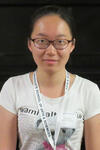Sisi Zhou
Honors & Awards
2019 John Sloane Fellowship Fund
Quantum metrology, which studies parameter estimation in quantum systems, has many applications in science and technology ranging from frequency spectroscopy to gravitational wave detection. Quantum mechanics imposes a fundamental limit on the estimation precision, called the Heisenberg limit (HL), which bears a quadratic enhancement over the standard quantum limit (SQL) determined by classical statistics. The HL is achievable in ideal quantum devices, but is not always achievable in presence of noise.
Quantum error correction (QEC), as a standard tool in quantum information science to combat the effect of noise, was considered as a candidate to enhance quantum metrology in noisy environment. This thesis studies metrological limits in noisy quantum systems and proposes QEC protocols to achieve these limits. First, we consider Hamiltonian estimation in Markovian master equations and obtain a necessary and sufficient condition called the “Hamiltonian-not-in-Lindblad-span” condition to achieve the HL. When it holds, we provide ancilla-assisted QEC protocols achieving the HL; when it fails, the SQL is inevitable even using arbitrary quantum controls, but approximate QEC protocols can achieve the optimal SQL coefficient. We generalize the results to parameter estimation in quantum channels, where we obtain the “Hamiltonian-not-in-Kraus-spa” condition and find single-letter formulas for asymptotic estimation precision by showing attainability of previously established bounds using QEC protocols. All QEC protocols are optimized via semidefinite programming. Finally, we show that reversely, metrological bounds also restrict the performance of error-correcting codes by deriving a powerful bound in covariant QEC.
